


Today, Harold Jackson, of Non-Filtered Productions will interview my Dad, Juanita, and me about the 1921 Tulsa Massacre. (see February 14 post.) Mr Jackson flew in from Pennsylvania.
Details will follow.
Details will follow.
Karla Scott, My name is Harold Jackson with Non-Filtered Productions out of Pennsylvania. We are starting a documentary on the 1921 race riots in Tulsa. We are searching for survivors or decendants of survivors of that massacre. We would like to discuss having an on camera interview with you. Please contact me Harold Jackson as soon as possible at the information below. Thank you in advance for your time and consideration.
HAROLD JACKSON III
Karla,
I'm writing to tell you thanks for allowing me to talk with you and your family. You were a great deal of help and I don't think the project would be as good without your assistance. I hope you will be satisfied with the finished product. Thank you again and continued blessing for you and your family. Feel free to contact me with any questions.
Harold Jackson III
Non Filtered Productions
Karla,
I'm writing to tell you thanks for allowing me to talk with you and your family. You were a great deal of help and I don't think the project would be as good without your assistance. I hope you will be satisfied with the finished product. Thank you again and continued blessing for you and your family. Feel free to contact me with any questions.
Harold Jackson III
Non Filtered Productions
article about justice
by Barbara Palmer
Stanford Report, February 16, 2005 :
Harvard law professor and author Charles Ogletree Jr., a Stanford alumnus and former university trustee, sees himself as a student of history, he told members of the Black Pre-Law Society and others on Feb. 7.
So Ogletree was stunned to learn in 2002 about a 1921 race riot in Tulsa, Okla., which, by some estimates, killed hundreds of African Americans and by all accounts decimated a prosperous African American business district known as "Black Wall Street" in less than a day. It was the worst act of domestic terrorism ever perpetuated within the borders of the United States, the legal scholar said.
The district, called Greenwood, was home to black-owned banks, hotels and theaters and a black professional class, said Ogletree, who serves as counsel for the Reparations Coordinating Committee, which seeks reparations for the "contemporary victims of slavery and the century-long practice of de jure racial discrimination which followed slavery." For African Americans, Greenwood "was the mecca of all America," Ogletree said. "Hatred, bigotry and prejudice took it away in the blink of an eye," he said.
The obscurity of the 1921 riot is no accident, but the result of a decades-long "conspiracy of silence" so effective that until recently a former Tulsa mayor was unaware of the riot's occurrence, Ogletree told the Kresge Auditorium audience. And from 1921 until 2001, when a 185-page report on the riot commissioned by the Oklahoma state legislature was published, there was a "pervasive sense" that African Americans were the cause, rather than the victims, of mob violence, he said.Setting the record straight
By Ogletree's account, the spark that ignited the riot occurred after a 19-year-old black man named Dick Rowland entered an elevator in a Tulsa office building in order to find a bathroom open to him under the state's Jim Crow laws. In the elevator, he stepped on the foot of a 17-year-old white female elevator operator. She slapped Rowland, who fled the elevator. What happened next is "what happens in a Southern town," Ogletree said. "The reports were: 'Black man assaults white woman.' By evening it was: 'Black man rapes white woman.'"
According to the commission's 2001 report, Rowland was arrested and jailed at the Tulsa County courthouse, where shots later were fired between a white mob assembled in reaction to inflammatory news accounts of Rowland's arrest and blacks gathered to protect Rowland from lynching. A newspaper editorial that reportedly said Rowland's lynching was "likely" has disappeared from city and state archives. (The case against Rowland was later dismissed.)
As violence erupted, Tulsa police deputized and armed hundreds of white men and boys who traveled into Greenwood, where some joined a mob in shooting at residents and setting fire to black-owned businesses and residences. When the Oklahoma National Guard was called in to restore order, troops disarmed blacks and took thousands of African American residents into "protective custody" by mass arrest, leaving the neighborhood unprotected. Twenty-two square blocks—1,256 homes and virtually every other structure, including a library and hospital, churches and schools—lay in ashes the next day. The 2001 commission report concluded that it was impossible to determine the number of people killed in the riot, although it is probable that the dead numbered between 100 and 300.
A preliminary report issued in 2000 by the commission concluded that the race riot was the violent consequence of institutionalized racial hatred tolerated by federal, state, county and city police. Although the final commission report recommended that restitution be made to riot survivors and descendants, a state resolution for reparations failed.
Ogletree was among lawyers who in 2003 sued the Oklahoma governor and Tulsa mayor and chief of police in federal court on behalf of plaintiffs including more than 125 survivors, who ranged in age from 89 to 105 years. Lower courts denied the claim, saying that the statute of limitations had expired, and in December 2004, a federal appeals court voted not to grant a rehearing of the case. (Four of 13 judges dissented in the case.)
Ogletree plans to petition for a hearing of the case by the U.S. Supreme Court, he said. But whether or not the Supreme Court agrees to hear the case this year, "it is not going to go away," he said.
"The refusal to even consider meaningful remedy for these survivors is hard to understand," he said, citing the examples of reparations paid to Japanese interned during World War II and the recent apology and a $5 million scholarship fund in the state of Louisiana created by J. P. Morgan Chase following the discovery that its 19th-century predecessor banks had owned slaves that had been loan collateral.
The arrogance of opponents to reparations "takes our breath away," he said. "To think about a case where you have the evidence, you have the victims, you have the record and the argument is that it's too late," he said. "It makes our legal system a mockery and our justice system a sham.
"Until there is justice in Tulsa, there can be justice in no other place in America. We will fight with every legal, political and moral weapon we have."
Ogletree urged audience members not to focus on financial aspects of reparations. "It's really about justice. It's really about correcting the past. And it's really about trying to make sure as we move ahead as a nation that we really are one people, not many."
So Ogletree was stunned to learn in 2002 about a 1921 race riot in Tulsa, Okla., which, by some estimates, killed hundreds of African Americans and by all accounts decimated a prosperous African American business district known as "Black Wall Street" in less than a day. It was the worst act of domestic terrorism ever perpetuated within the borders of the United States, the legal scholar said.
The district, called Greenwood, was home to black-owned banks, hotels and theaters and a black professional class, said Ogletree, who serves as counsel for the Reparations Coordinating Committee, which seeks reparations for the "contemporary victims of slavery and the century-long practice of de jure racial discrimination which followed slavery." For African Americans, Greenwood "was the mecca of all America," Ogletree said. "Hatred, bigotry and prejudice took it away in the blink of an eye," he said.
The obscurity of the 1921 riot is no accident, but the result of a decades-long "conspiracy of silence" so effective that until recently a former Tulsa mayor was unaware of the riot's occurrence, Ogletree told the Kresge Auditorium audience. And from 1921 until 2001, when a 185-page report on the riot commissioned by the Oklahoma state legislature was published, there was a "pervasive sense" that African Americans were the cause, rather than the victims, of mob violence, he said.Setting the record straight
By Ogletree's account, the spark that ignited the riot occurred after a 19-year-old black man named Dick Rowland entered an elevator in a Tulsa office building in order to find a bathroom open to him under the state's Jim Crow laws. In the elevator, he stepped on the foot of a 17-year-old white female elevator operator. She slapped Rowland, who fled the elevator. What happened next is "what happens in a Southern town," Ogletree said. "The reports were: 'Black man assaults white woman.' By evening it was: 'Black man rapes white woman.'"
According to the commission's 2001 report, Rowland was arrested and jailed at the Tulsa County courthouse, where shots later were fired between a white mob assembled in reaction to inflammatory news accounts of Rowland's arrest and blacks gathered to protect Rowland from lynching. A newspaper editorial that reportedly said Rowland's lynching was "likely" has disappeared from city and state archives. (The case against Rowland was later dismissed.)
As violence erupted, Tulsa police deputized and armed hundreds of white men and boys who traveled into Greenwood, where some joined a mob in shooting at residents and setting fire to black-owned businesses and residences. When the Oklahoma National Guard was called in to restore order, troops disarmed blacks and took thousands of African American residents into "protective custody" by mass arrest, leaving the neighborhood unprotected. Twenty-two square blocks—1,256 homes and virtually every other structure, including a library and hospital, churches and schools—lay in ashes the next day. The 2001 commission report concluded that it was impossible to determine the number of people killed in the riot, although it is probable that the dead numbered between 100 and 300.
A preliminary report issued in 2000 by the commission concluded that the race riot was the violent consequence of institutionalized racial hatred tolerated by federal, state, county and city police. Although the final commission report recommended that restitution be made to riot survivors and descendants, a state resolution for reparations failed.
Ogletree was among lawyers who in 2003 sued the Oklahoma governor and Tulsa mayor and chief of police in federal court on behalf of plaintiffs including more than 125 survivors, who ranged in age from 89 to 105 years. Lower courts denied the claim, saying that the statute of limitations had expired, and in December 2004, a federal appeals court voted not to grant a rehearing of the case. (Four of 13 judges dissented in the case.)
Ogletree plans to petition for a hearing of the case by the U.S. Supreme Court, he said. But whether or not the Supreme Court agrees to hear the case this year, "it is not going to go away," he said.
"The refusal to even consider meaningful remedy for these survivors is hard to understand," he said, citing the examples of reparations paid to Japanese interned during World War II and the recent apology and a $5 million scholarship fund in the state of Louisiana created by J. P. Morgan Chase following the discovery that its 19th-century predecessor banks had owned slaves that had been loan collateral.
The arrogance of opponents to reparations "takes our breath away," he said. "To think about a case where you have the evidence, you have the victims, you have the record and the argument is that it's too late," he said. "It makes our legal system a mockery and our justice system a sham.
"Until there is justice in Tulsa, there can be justice in no other place in America. We will fight with every legal, political and moral weapon we have."
Ogletree urged audience members not to focus on financial aspects of reparations. "It's really about justice. It's really about correcting the past. And it's really about trying to make sure as we move ahead as a nation that we really are one people, not many."
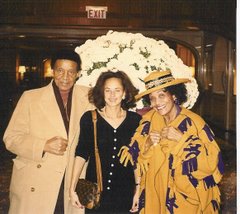
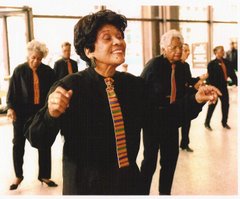
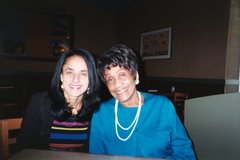
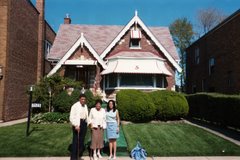


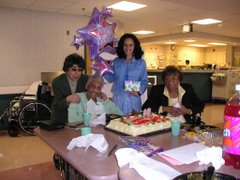
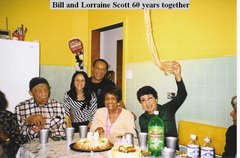
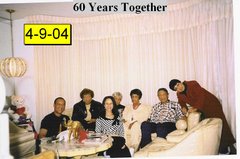

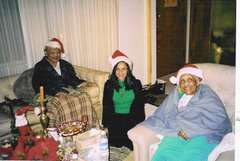
.jpg)
No comments:
Post a Comment